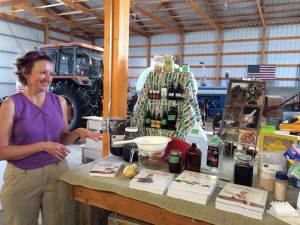When I first heard we were going to the Cory Farm I was excited but did not think it was going to be THAT different from the other small unconventional farms we had already visited. Wow, how wrong I was. The first thing that I noticed was different was how prepared they were for our visit. Tom Cory was clearly not the type of person to merely stand idly by and chat. As soon as we got there we had a variety of farm chores to contribute to while Tom told us all about his family’s unique perspective on food. I had barely finished the (much needed) cup of coffee he had generously offered before part of our group was out milking goats, harvesting a patch of asparagus, tending the chickens, working in the pasture with the sheep and cattle, and finally working in the garden.
The Cory Farm business’s focus was clearly on producing high quality all-natural animal products. This aligned with their dietary beliefs that lauded the health benefits of pasture raised meat, raw milk, fermented foods, and animal fats such as butter. Since their business model and deeply held convictions on health were predominantly centered around animal products I was surprised by how accepting the Cory’s immediately were about my vegan diet. Neither Tom nor Mary seemed to even question my dietary choices, although I know for certain that they disagree with them strongly. This was in stark contrast to some of my other experiences with people involved in animal agriculture who while emphasizing their tolerance of other people’s choices still found a way to work in how their way was the right way and why I was deluded. They even went as far as to leave the butter off some of the side items of our lunch even though it is apparent how much they value the health benefits of putting butter on most everything. While this came as a pleasant surprise, I suspect that certain more radical aspects of their diet and lifestyle choices (such as the fermented foods and homeopathic remedies) have probably accustomed them to criticism and given them a sensitivity to these issues.
Tom Cory spoke a lot about freedom and liberties, specifically applying them to the context of food production methods. While he obviously held firm convictions that are opposed to conventional agriculture methods he still asserted that there was room for all passions, interests, personal choices. He made this point by comparing the food industry to a table where he just wants a place. While many places we had visited such as Iowa Pork, Iowa corn growers, Summit Farms, and others had claimed that the ideal system is one where organic and all natural practices exist alongside current conventional practices I kind of got the feeling that they were just saying that without really meaning it. But it seemed to me that the Corys truly believed in this respect for individual freedoms and choice and they acted consistently in living out this belief. The highlight of my time with the Corys were hanging out with their youngest daughter and learning about homeopathic remedies. I was fascinated by Mary’s home-made medicines and have wanted to one day do something similar. She had a comprehensive book on the subject called where she said she had gotten many of her recipes and advice and I was really interested in purchasing the book, but when I mentioned it to her she gave me a copy she had gotten for free. I’ve already read through a lot of it and have learned a lot and been inspired to pursue homeopathic remedies whenever possible.

Mary explaining her homeopathic remedies! (also, note how she looks like she drinks from the fountain of youth)
Our visit to the ethanol plant also got me thinking more about the vast amount of cornfields that seem to make up the vast majority of Iowa agriculture. We discussed with Jesse the issues surrounding the fact that 1/2 of all corn grown becomes ethanol. I have mentioned in previous blogs my skepticism of the mono-crop system but only focusing on the part of corn that goes to animal feed and corn syrup rather than ethanol. I did now know that much about ethanol before today but had head previously doubts about its sustainability and efficiency, particularly in its water use. Our guide Jesse did a lot to help clear this up for me by explaining how the water was reused, as well as pointing out the oil companies interest in promoting critiques of ethanol production as it takes away 10% of their market. Jesse was very honest in saying that he did not personally believe that corn is the most efficient plant to use for biofuel but that Iowa was just using what they were already good at growing rather than changing their entire way of doing things. I still do not approve of the mono-crop system but my time at the ethanol plant made me consider how producing so much of one thing could potentially help alleviate our energy crisis and reduce our reliance on oil.

